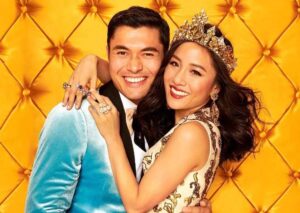by The Cowl Editor on August 30, 2018
Arts & Entertainment

by Kerry Torpey ’20
A&E Co-Editor
Since the 1993 release of the blockbuster The Joy Luck Club, there has not been a Hollywood film with a majority Asian cast, until now. The film adaptation of the best-selling novel, Crazy Rich Asians, proves that the industry can release a successful, number one film with talented Asian actors, leading the way for greater roles and opportunities.
Directed by Jon Chu, Crazy Rich Asians follows Rachel Chu (Constance Wu), a New York University economics professor who finds out that her boyfriend, Nick Young (Henry Golding), comes from a very wealthy family. As she accompanies him on a trip to Singapore for his best friend’s wedding, Rachel faces harassment and judgement from Nick’s family for her lower socioeconomic status.
Historically, Hollywood created media rules and restrictions, such as the Motion Picture Production Code (The Hays Code), that favored white actors in leading roles over people of color. Rather than cast the appropriate actors for roles written for Asians, Hollywood tends to put white actors in “yellowface.”
Yellowface is a cinematic technique in which actors of non-Asian descent wear makeup to appear as if they were Asian. A prime example of this is Warner Oland, an American-Swedish actor who, during the early 20th century, played multiple roles depicting Chinese characters.
Viewers likely recognize Wu from her breakout role as Jessica Huang in the hit ABC series Fresh Off the Boat, which is “the second Asian American family sitcom ever produced,” according to Julia Carrie Wong of The Guardian. In an interview with Wong, Wu discusses her struggle to become a “spokeswoman for Asian American frustration.”
Describing herself as “very impulsive and reactive,” Wu explains that she does not have “a model” to look to in carrying “the weight of expectations from an entire generation of Asian Americans yearning to be seen.” With generations of white A-list actors, from Mickey Rooney in Breakfast at Tiffany’s to Scarlett Johansson in Ghost in the Shell and Matt Damon in The Great Wall, Asian American audiences have had proper representation within the industry taken away.
Nancy Yuen, author of Reel Inequality: Hollywood Actors and Racism, discusses the irony in the lack of opportunity for Asian actors. She notices the industry’s interest in things like manga and other Asian media, but explains, “It’s like they want our look and our stories and our martial arts, but they don’t want Asians.”
According to Vox, Crazy Rich Asians, which has spent the past two weeks at number one at the box office, has made a total of $76.8 million. Between the first two weekends, it dropped under six percent following initial release, which is impressive compared to a film like Batman v Superman: Dawn of Justice, which dropped 69 percent.
In terms of financial and critical success, Crazy Rich Asians is triumphant. More importantly, the film is evidence that Hollywood should not underestimate the abilities and skills of Asian and Asian American actors. “We shouldn’t be fighting over scraps,” says Yuen ”We should be fighting for the system to expand, so that all of us can get access to roles.”